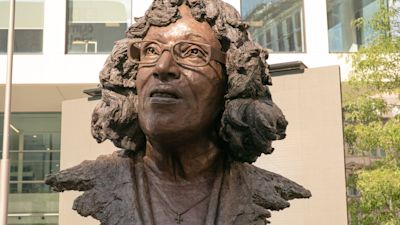Explainer
Black history: Everything you need to know about the new Black curriculum in Welsh schools

Wales has become the first nation in the UK to introduce a new Black curriculum across all primary schools and some secondary schools for the new term.
The new curriculum is designed to inspire children and young people to become more informed citizens of Wales and the world by helping them to understand and respect their own and each other’s cultures and traditions.
A Welsh Government spokesperson told ITV Wales: “In order to progress as a society, our education system must broaden our understanding and knowledge of the many cultures which have built our past and present.
“The Welsh Government is committed to creating an anti-racist Wales, which calls for zero tolerance of racism in all its guises.
“It’s important that we embed learning about Black, Asian and minority ethnic histories and experiences in our new curriculum so children and young people can develop an understanding of the complex, diverse nature of societies.”
Will the new curriculum focus on particular events or subjects in history?
It is understood that the new curriculum will allow for the histories of Black, Asian and minority ethnic communities to be included in all aspects of learning rather than focusing on individual events or figures.
A Welsh Government spokesperson gave ITV Wales examples of what this might look like: “Teachers will be able to design lessons around topics of their choosing. For example, pupils might learn about Betty Campbell MBE, an inspiring activist and Wales’ first black headteacher, and Abdulrahim Abby Farah from Barry, the Deputy Secretary General for the United Nations who played an important role in the talks to free Nelson Mandela.”
How will the curriculum work across the school year?
In the past, big events or important figures within Black communities were mostly taught during the period of Black History Month but the experiences and stories of Black, Asian and minority ethnic communities and people will be included across this new curriculum rather than as a separate subject.
According to the Welsh Government, schools will be able to explore a range of topics like diversity and race in literature, history and society, as well as Black, Asian and minority figures in literature, history, sport, science, technology and maths.
Why are these changes happening now in Wales?
In July 2020, former Minister for Education, Kirsty Williams, asked Professor Charlotte Williams OBE to lead a group of experts in an independent review to advise on the changes required to improve the teaching of themes and experiences relating to Black, Asian and minority ethnic communities across all parts of the school curriculum.
In November 2020, the working group published an interim report that said the current curriculum focused "too much on slavery” and that there were a lack of bilingual resources to teach ‘BAME’ themes and contributions to Welsh school children. The report argued that focusing on the historical negative events could lead to children in those communities portraying themselves in a negative light.
In March 2021, the Welsh Government accepted all 51 recommendations for the final report from the working group.
There were 34,000 signatures petitioning for the move and various campaigns.
Angel Ezeadum, former Welsh Youth Parliament member and campaigner first brought the issue to the attention of the Senedd in 2019, but the campaign picked up momentum after the reinvigorated Black Lives Matter movement.
Angel told ITV Wales: “The journey campaigning was long but rewarding.
“Studying for my GCSE's I chose history and the only mention of Black history occurred in the slavery topic in Year 9. For this to be the first impression that many young and impressionable minds are fed is disappointing and cause for later issues developing in the future.
“I knew that I had the platform as a Welsh Youth Parliament member to amplify issues that I and my peers felt to be of concern for ourselves but also for wider society."
Professor Charlotte Williams OBE, who is the chair of 'Black, Asian and Minority Ethnic Communities, Contributions and Cynefin in the New Curriculum Working Group', told ITV Wales: “Schools across Wales are being encouraged to rise to the challenge of integrating Black history and the contributions of Black, Asian and minority ethnic people across all learning areas in the new curriculum. New resources, training and guidance are available to support this priority. This initiative is unprecedented and poised to make a significant and positive difference to the experience of all pupils in Wales.
"This isn’t about adding an element of Black and minority ethnic history here and there in the new curriculum, but about reimagining learning and teaching across all the elements of the curriculum so that it reflects a Wales that is, and always has been, ethnically diverse, internationalist in its outlook and progressive in its aspirations.”
How will this benefit the education of Black and ethnic minority children?
The new curriculum framework is intended to offer opportunities to support school pupils with a broad and balanced education.
In investigating and exploring the human experience within their localities and elsewhere in Wales, as well as in the wider world, it is hoped that learners will be supported to discover their heritage and develop a sense of place.
Angel Ezeadum expressed her hopes that the new curriculum will build a more tolerant society that celebrates identities and differences. She told ITV Wales: “The younger generation will be our future leaders, front line workers and the lifeline of society thus it is so important to instil an inclusive mindset into them from an early onset.
“This is only just a small step towards the goal for equality and a world with zero discrimination so we must not get too carried away. However, it is important to celebrate this success and hope for many more to come."